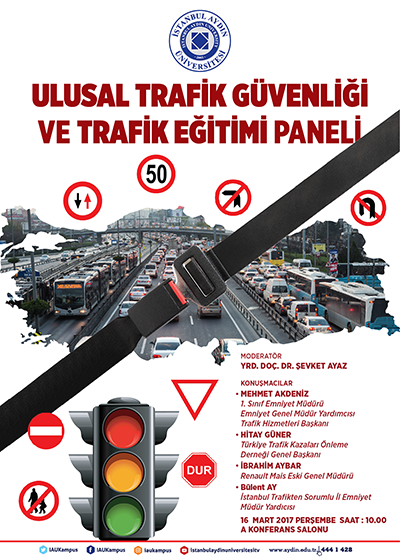
Assist. Prof. Şevket AYAZ: The damages of traffic accidents are not only death, injury and property damage. In addition to it, there are very serious damages that are not visible. When you consider the negative effects, psychological pressures, care costs, the inability to work in case of disability, the inability to make a profit, and the extra care costs, the costs of the accidents reach incredible numbers and we face a very serious loss. That is why there is a need for planned and disciplined studies to prevent them. These works, of course, especially the security forces of our state; all responsible institutions such as local administrations, ministry of health and highways will lead. Besides; Press, media, non-governmental organizations and universities also have serious responsibilities.
Bülent AY, Deputy Chief of Police of Istanbul: Istanbul is one of the most populous metropolises in Turkey and one of the few in the world. Being a city of education, with its constantly developing structure due to the health activities that have developed recently, our Istanbul also includes the sectors of air, sea and land transportation between the two continents in all seasons, due to its location on two peninsulas of the Asian European continent, its physical structure and between two continents. Due to these features of our city, the large population of our country, and its location at the transportation junction, it has a large population of people, both domestic and foreign guests and its own population. Due to the socio-cultural structure of this city, we see meetings, symposiums and many similar activities in Istanbul, of course, besides these reasons and gains, they also bring some troubles and problems. Their biggest problem is traffic.
İbrahim AYBAR, Renault MAİS General Manager: So everything starts and ends with people. At that time, we had a very valuable sociologist and statesman among us. Our former Minister of State, Minister of Tourism, Tınaz TİTİZ, made a very nice definition that I have never forgotten and that I have always made a motto for myself. He said: "For the solution of these things, the issue is simple, there are three mental microbes in our people, if we kill them, the issue will be over." He also described the microbes very well: "First, the microbe 'first someone else corrects the mistake, then I fix it'. Why don't we fix it first, why don't we fix it first, without the need for warning of others. When we make an accident or mistake, why don't we immediately notice the mistake and try not to go through it again. "The traffic is blocked, the seat lane is empty, we always try to get in there, or if we have somehow entered there, why don't we be careful not to enter it again. Why do we try to say, 'fix them and then come to me,' if others make mistakes, enter the safety lane, that is one of the issues." said. First of all, we should adopt the principle of not making mistakes, and equip our lives with the virtue of this. Second, "Yes, but still...", "Yes, rules, but I'll still get away", "Yes, the rule prevents, but let me get through anyway". Why? If there is a rule, then it will be followed, and if the rule is wrong, the rule will be changed. After that, that rule will be followed again. That's the second microbe. Third, the "What's for me, what's for you" microbe. "There is a traffic problem here, look, this person is making a mistake over there, let's warn him." What is the mentality of me, no one interferes. It's good that you are the ones who don't say "what about me" right now, you are listening to us. Likewise, the "what's wrong with you" germ. Someone is making a mistake, you are warning. The answer to you is, "What to you". What does it mean to you? it puts us all in danger, it puts us all at risk somewhere. Then no one has the right to say "what to you" when they make a mistake and are warned. If these three microbes disappear from our heads, if they do not somehow enter our DNA, right in our childhood, then we can solve this problem fundamentally.
Kenan AYDOĞAN, Traffic App. try. Head of Department Despite the measures taken and the improvements made, we still see that the death toll per hundred thousand people in Turkey is around four. In a study conducted by the World Bank on developing countries, it is said that 1.5 percent of the gross national product is due to traffic accidents as socio-economic loss. In this respect, Turkey also has a great loss, my friends. A loss of nearly two billion dollars. If this loss had not remained a burden to the national economy due to traffic accidents, we would have had the opportunity to carry the socio-economic life we live in today to a much higher level. In 2008, 2 thousand 948 people died in 2 thousand 264 fatal accidents. In 2016, 845 fatal accidents and 2,266 people died. Unfortunately, the deaths continue. Maybe deaths continue in many parts of the world. But our only wish and expectation and all our efforts are to approach the zero target by reducing the number of deaths in this direction. For this, not only us as safety guards, but also you as road users, drivers and passengers have important duties.